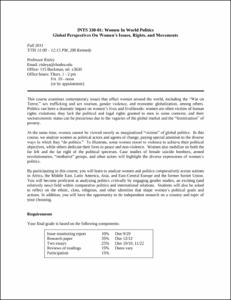Please use this identifier to cite or link to this item:
http://hdl.handle.net/10267/15858Full metadata record
| DC Field | Value | Language |
|---|---|---|
| dc.contributor.author | Risley, Amy | - |
| dc.date.accessioned | 2013-03-20T15:47:33Z | - |
| dc.date.available | 2013-03-20T15:47:33Z | - |
| dc.date.issued | 2011-08-24 | - |
| dc.identifier.uri | http://hdl.handle.net/10267/15858 | - |
| dc.description | This syllabus was submitted to the Office of Academic Affairs by the course instructor. Uploaded by Archives RSA Josephine Hill. | en_US |
| dc.description.abstract | This course examines contemporary issues that affect women around the world, including the “War on Terror,” sex trafficking and sex tourism, gender violence, and economic globalization, among others. Politics can have a dramatic impact on women’s lives and livelihoods: women are often victims of human rights violations; they lack the political and legal rights granted to men in some contexts; and their socioeconomic status can be precarious due to the vagaries of the global market and the “feminization” of poverty. At the same time, women cannot be viewed merely as marginalized “victims” of global politics. In this course, we analyze women as political actors and agents of change, paying special attention to the diverse ways in which they “do politics.” To illustrate, some women resort to violence to achieve their political objectives, while others dedicate their lives to peace and non-violence. Women also mobilize on both the far left and the far right of the political spectrum. Case studies of female suicide bombers, armed revolutionaries, “motherist” groups, and other actors will highlight the diverse expressions of women’s politics. By participating in this course, you will learn to analyze women and politics comparatively across nations in Africa, the Middle East, Latin America, Asia, and East-Central Europe and the former Soviet Union. You will become proficient at analyzing politics critically by engaging gender studies, an exciting (and relatively new) field within comparative politics and international relations. Students will also be asked to reflect on the ethnic, class, religious, and other identities that shape women’s political goals and actions. In addition, you will have the opportunity to do independent research on a country and topic of your choosing. | en_US |
| dc.language | English (United States) | - |
| dc.language.iso | en_US | en_US |
| dc.publisher | Memphis, Tenn. : Rhodes College | en_US |
| dc.relation.ispartofseries | Syllabi CRN;12712 | - |
| dc.rights | Rhodes College owns the rights to the archival digital objects in this collection. Objects are made available for educational use only and may not be used for any non-educational or commercial purpose. Approved educational uses include private research and scholarship, teaching, and student projects. For additional information please contact archives@rhodes.edu. Fees may apply. | - |
| dc.subject | International Studies, Department of | en_US |
| dc.subject | Syllabus | en_US |
| dc.subject | Curriculum | en_US |
| dc.subject | Academic departments | en_US |
| dc.subject | Text | en_US |
| dc.subject | 2011 Fall | en_US |
| dc.title | INTS 330-01, Global Perspectives on Women's Issues, Rights and Movements, Fall 2011 | en_US |
| dc.type | Other | en_US |
| Appears in Collections: | International Studies. Syllabi | |
Files in This Item:
| File | Description | Size | Format | |
|---|---|---|---|---|
| 2011_Fall_INTS_330-01.pdf | 259.18 kB | Adobe PDF |  View/Open |
Items in DSpace are protected by copyright, with all rights reserved, unless otherwise indicated.